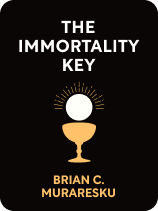

This article is an excerpt from the Shortform book guide to "The Immortality Key" by Brian C. Muraresku. Shortform has the world's best summaries and analyses of books you should be reading.
Like this article? Sign up for a free trial here.
What is Gnosis? Why did the Church reject the Gnostic Gospels?
The Gnostic Gospels are a collection of books purportedly written by followers of Jesus, likely between AD 120 and 150. Although the writers themselves professed to be devotees of Jesus and claimed to be revealing truths from him, leaders of the early Christian church omitted these books from the Biblical canon.
Here’s why the Gnostic texts were excluded from the official Christian canon.
The Gnostic Gospels
Muraresku says the Gnostic Gospels were originally part of the Christian scriptures but were later eliminated because they encouraged experiencing direct union with God. He explains that the more orthodox leaders of the Church wanted the priests to be the only arbiters of God because people who have their own direct experience of God are harder to convert and control. So they ultimately sought to keep the populace from these mystical experiences.
Muraresku believes these gospels provide a window into the beliefs and traditions that defined proto-Christianity, and that they explain why it would have appealed to the ancient Greeks—because, he says, Christianity in its original form was itself a mystical tradition.
| What Is Mysticism? The word mysticism comes from the Greek word mystes, which refers to someone who is initiated into a secret cult by achieving union with the divine. In other words, a mystical practice is one that involves the individual’s direct experience of divinity or “God.” There are many mystical paths and traditions that use a variety of methods to achieve such transcendental states. Some examples include meditation, prayer, yoga, asceticism, or consciousness-altering substances. Despite a concerted effort by early Christian leaders to expel mystical practices, a mystical tradition in Christianity has remained to this day. Christian mystics are often ostracized by mainstream Christianity, however, because they tend to emphasize direct communion with God over adherence to scriptural dogma. |
The Separation Between Humans and the Divine
In the Greek language, the word “gnosis” means knowledge. In the Gnostic tradition, this implies seeking a hidden knowledge of the divine through direct spiritual experience. Gnosticism flourished in the Greco-Roman world from around AD 80-200. The major feature distinguishing the Gnostic texts and the texts that were accepted as canon (forming the “orthodox” scriptures) is the idea of the separation between humans and the divine.
The Orthodox tradition says that God is entirely separate from humanity and essentially unknowable to humans. In this tradition, one must follow the instructions in the texts, and of the church leaders, as a guide for living, rather than seeking that knowledge for oneself. Humans should follow Jesus’ teachings, but can never actually become like him, in the sense of becoming divine. This is the view of most mainstream Christian denominations today.
Conversely, Gnostics believe the divine is accessible to everyone within themselves. There is no separation between human and divine; one must only know oneself to know God. In this tradition, Jesus serves as an example for humanity, and everyone has the potential to become divine like him. It was essentially this distinction that determined which gospels were canonized, and which were rejected.

———End of Preview———
Like what you just read? Read the rest of the world's best book summary and analysis of Brian C. Muraresku's "The Immortality Key" at Shortform.
Here's what you'll find in our full The Immortality Key summary:
- The secret that kept ancient Greeks and early Christians from fearing death
- The origins of Christianity and its overlap with pre-existing pagan customs
- The real reason why women can't be priests






